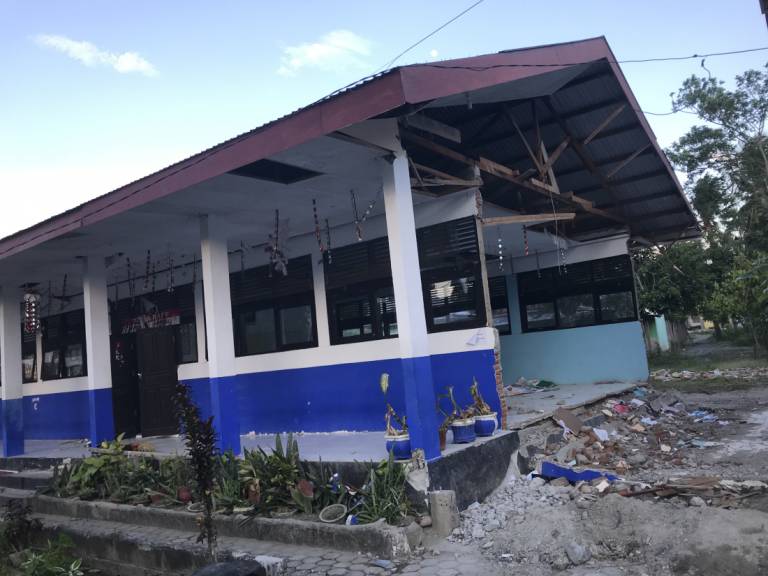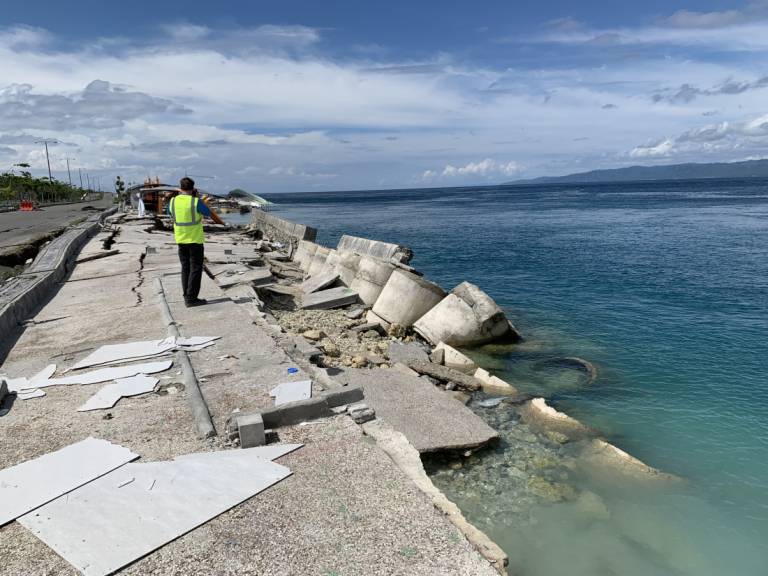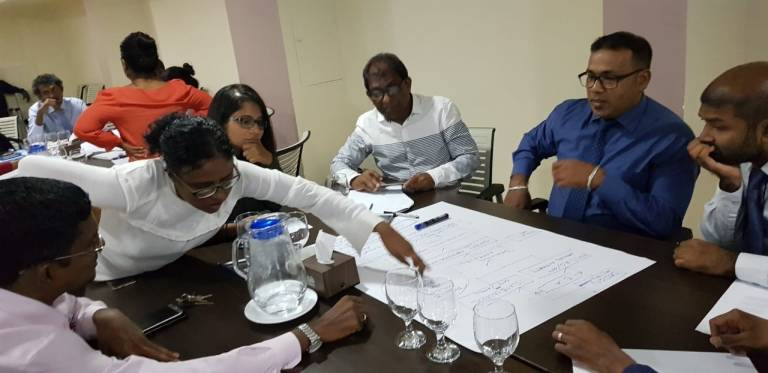CEGE Research in Focus: EPICentre
25 March 2019
In the first of a new series on CEGE’s renowned, world-leading research, we take a look at the multidisciplinary, disaster management focused EPICentre, and the great period of success it has recently enjoyed, from grants and fieldwork to the new GCRF Urban Disaster Risk Hub.

As well as recently receiving grants for five projects and two fellowships, EPICentre has also seen Director Prof Rossetto leading fieldwork in Indonesia and Maldives, plus three of its members appointed co-investigators of the Global Challenges Research Fund (GCRF) Urban Disaster Risk Hub.
Founded in 2007 as a dynamic, multidisciplinary research centre investigating risk from natural hazards to society and the built/natural environments, EPICentre boasts members from across UCL. Located within the Department of Civil, Environmental and Geomatic Engineering (CEGE), the centre collaborates with the UCL Institute for Risk and Disaster Reduction, and the UCL Hazard Centre. A member of the Willis Research Network, EPICentre also has strong industry links. CEGE’s popular Earthquake Engineering with Disaster Management MSc is run by EPICentre staff.
GCRF Urban Disaster Risk Hub
Three EPICentre members – Director Prof Tiziana Rossetto, Co-Director Prof Dina D'Ayala and Deputy Director Dr Carmine Galasso – plus CEGE Prof Francesca Medda, are co-directors of the newly funded, £19.6 million GCRF Urban Disaster Risk Hub.
Led by the University of Edinburgh, and with a focus on South America, East Africa, the Middle East and South-Central Asia, the Urban Disaster Risk Hub will work with international agencies, aiming to bring disaster risk management to the centre of global urban policy and practice, in order to strengthen the voice of the urban poor. With 60% of the area expected to be urban by 2030 yet to be built, the Urban Disaster Risk Hub hopes to utilise this window of opportunity, and embed disaster risk management in future urban development.
Within the Hub, Prof Rossetto, Professor of Earthquake Engineering in CEGE, will lead all the engineering tasks of the project. Dr Galasso, Associate Professor in CEGE, will be chairing a Risk Modelling Technical Activity Group, working across different work packages.
Both Prof Rossetto and Dr Galasso are confident that EPICentre’s involvement in the Urban Disaster Risk Hub is a “fantastic opportunity” to ensure disaster risk management is at the forefront of future urban planning and development in these areas. “The territories the Hub will focus on face varied challenges,” Dr Galasso notes, “from nature, population growth and resource demand. Having solid disaster risk management embedded in urban policy and practice will give poorer cities more resilience. EPICentre staff are looking forward to working with colleagues from the University of Edinburgh and beyond to really make a difference.”
Links
- Global Challenges Research Fund
- Natural Environment Research Council press release
- Prof Rossetto's UCL IRIS profile
- Prof D'Ayala's UCL IRIS profile
- Prof Medda's UCL IRIS profile
- Dr Galasso's UCL IRIS profile
- The University of Edinburgh
Fieldwork
EEFIT Sulawesi Mission
EPICentre Director Prof Rossetto led an Earthquake Engineering Field Investigation Team (EEFIT) in November 2018 to Palu, on the Indonesian island of Sulawesi. This was the site of the devastating September 2018 earthquake and tsunami, which, together with related natural disasters, affected over 70,000 people. The EEFIT mission assessed the impacts of the event on the built environment, as well as management and mitigation practices in place. The knowledge resulting from the mission will be invaluable to the disciplines of structural, civil and geotechnical engineering, as well as natural hazard and risk assessment, ultimately helping to reduce losses from future events.
The international EEFIT mission team, including both academics and industry professionals, produced a blog and a series of vlogs documenting their findings. Prof Rossetto noted the severity of the effects the team found, stating “I have been to several earthquake and tsunami disasters before, but I have never seen landslides of the extent observed in Palu, nor such subsidence of coastal areas, where entire beach areas had disappeared into the sea. At the time of the mission much was unknown about these hazards. Our team are now certain that the landslide at Patobo was initiated by liquefaction, which in turn occurred due to the earthquake shaking the soil there, which had high sand content and was highly saturated with water.”

CEGE PhD student Rohit Adhikari, whose research focuses on the seismic safety of school buildings, was also part of the EEFIT mission team, helping to provide insight to charity Save the Children regarding improved resilience of Sulawesi schools. Rohit commented that the field visit was a “unique opportunity to witness and understand how school buildings suffer damage in an earthquake. The failure modes and damage mechanisms in the buildings are of invaluable importance because these will compliment my analytical prediction of the failure mechanisms that I have been developing using numerical modelling techniques.”
Links
- EEFIT Indonesia blog
- Tsunami and Disaster Mitigation Research Center
- Save the Children Sulawesi article
Maldives Building Regulatory Capacity Assessment – First Workshop
In early 2019, EPICentre Director Prof Rossetto also organised a workshop in Maldives, concerned with the improvement of building regulations. Along with urban planning and governance experts Fathimath Rasheed and Aishath Abdulla, discourse and consultations with local stakeholders were facilitated, with the workshop aiming to identify both barriers to and opportunities for such improvements.

Links
Grants
To add to the GCRF Urban Disaster Risk Hub success and field work activity, EPICentre has also recently been awarded grants for five projects and two fellowships. Two grant awards were received from the Global Challenges Research Fund, and the UCL Small Grants scheme. The latter is funded by Research England, and supports small research projects that address challenges faced by developing countries.
Out of 63 applications, 14 projects were selected for funding, with two coming from EPICentre; i-RESIST and HEARTS-SL. Prof Rossetto is Principal Investigator (PI) for the latter, which stands for ‘Hospital Engineering Assessment for Resilience to Tsunami & Storm surge.’ The target country is Sri Lanka, and the co-investigators are Dr Galasso and Prof Ian Eames from UCL Mechanical Engineering.
Dr Galasso is the PI for i'i-RESIST: Increasing REsilience of Schools in Indonesia to earthquake Shaking and Tsunami.' The target country is Indonesia, and the co-investigator is Prof Rossetto. Both projects have been awarded £100,000.
Dr Fabio Freddi, a Lecturer in Structural Design within CEGE, and Dr Galasso received £78,400 (of which £57,000 has been awarded to UCL) for the project ‘Improved Community Performance from Seismically Resilient Strategic Infrastructure Facilities,’ funded through the Scheme for Promotion of Academic and Research Collaboration (SPARC) by the Ministry of Human Resource Development (MHRD, Department of Higher Education), Government of India.
And CEGE/EPICentre PhD student David Wilkie has been awarded a very prestigious Engineering and Physical Sciences Research Council (EPSRC) Doctoral Prize Fellowship, worth c. £230,000, on ‘Resilience-Based Design and Life-Extension of Offshore Wind Farms’.
There has been further success for Dr Galasso, who is the recipient alongside Prof D’Ayala of a €505,000 award as part of a new €8 million Horizon 2020 project called ‘TURNkey: Towards more Earthquake-resilient Urban Societies through a Multi-sensor-based Information System enabling Earthquake Forecasting, Early Warning and Rapid Response actions’. The TURNkey consortium includes a strong multi-disciplinary team of experts from 21 partner institutions (both universities/research centres and private companies) in 10 European countries. The UCL team will lead a work package and several tasks within the three year project.
Dr Galasso and Prof D'Ayala have also received £149,979 (of which £90,000 has been awarded to UCL) for the project ‘CHeRiSH: Cultural Heritage Resilience and Sustainability to multiple Hazards.’ CHeRiSH is funded by the British Council, as a Newton Fund Institutional Links grant, in partnership with the University of the Philippines, Visayas; Central Philippine University, and De La Salle University, Manila.
The industrious Dr Galasso, has also received a €212,934 Marie Curie Individual Fellowship for Dr Roberto Gentile, a current UCL IRDR Research Associate, to work in CEGE and EPICentre on ‘MULTIRES: MULTI-level framework to enhance seismic RESilience of RC buildings’.
Dr Galasso explained that these grants, awards and fellowships “are the product of a lot of hard work as a team, and all relevant EPICentre staff are very excited about the opportunities that such grants and support open up. In particular, I am very much looking forward to seeing what my PhD student David Wilkie and my colleague Dr Gentile will achieve with their well-deserved Fellowships, and I very much look forward to continuing to collaborate with them on such inspiring projects.”
Links
- EPICentre website
- UCL Small Grants scheme
- UCL Mechanical Engineering
- MHRD
- EPSRC
- Horizon 2020
- British Council Newton Fund
- University of the Philippines, Vasayas
- Central Philippine University
- De La Salle University, Manila
- Marie Curie Individual Fellowship
Image credits
- Lead image: EEFIT
- Palu coast: EEFIT
- Maldives workshop: Prof Rossetto
 Close
Close

